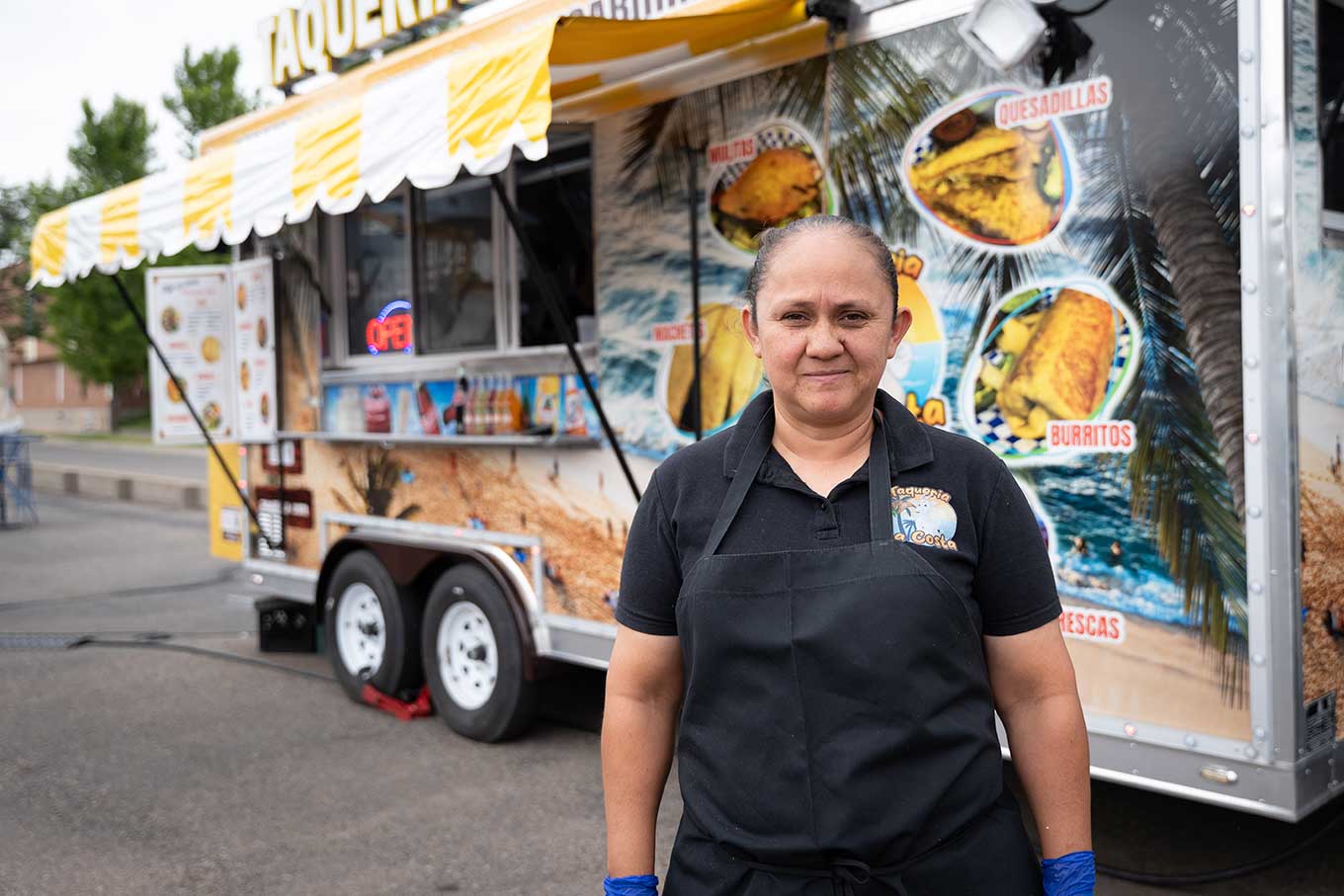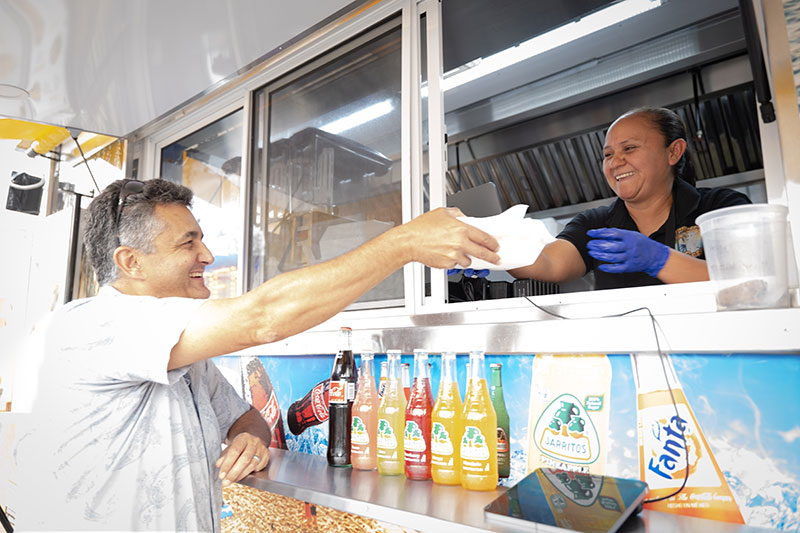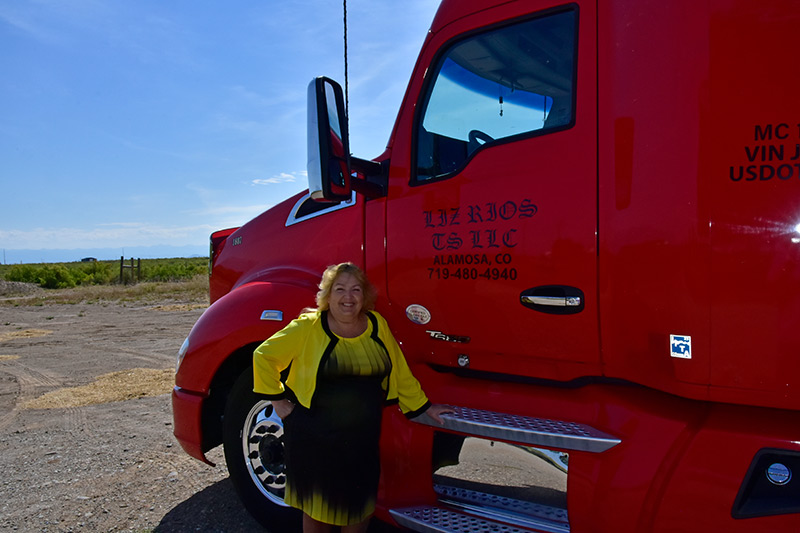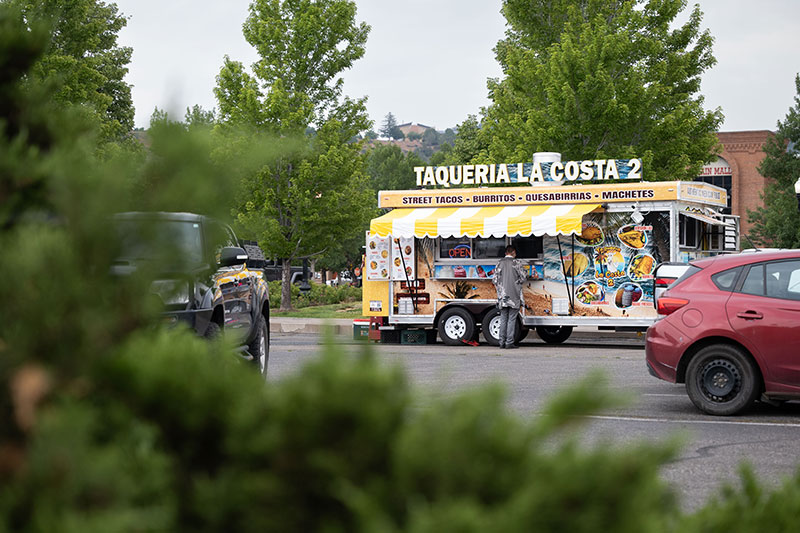“Always Keep Moving Forward”: Immigrant Women-Led Businesses See Success in Rural Colorado
Leer en español
Maria Laguna stands outside her food truck Taquería La Costa 2 in Durango, Colo., on Thursday, July 17, 2025. Laguna received a loan from First Southwest Community Fund’s Fortaleza Fund, which is designed to help immigrants start or operate a business. She now operates two food trucks in Durango. Photo by Corey Robinson / Special to The Colorado Trust
By Saja Hindi
The shelves are lined with everyday items, many from Guatemala and Mexico—shoes, baby clothes for baptisms, pots and pans, blankets, canned goods, sodas. The specialty grocery store on Main Street in Alamosa serves up reminders of home for some immigrants living in the area.
It also highlights a source of pride: A Guatemalan immigrant woman owns it.
“There are a lot of people who come into the store to buy things, and they ask me, ‘Are you from Guatemala?’ And I say, ‘yes,’ and they say, ‘Oh, that’s so nice to see that you could have a business here in the U.S. We are so proud, and we support you,’” La Tienda Guatemex owner Magdalena said through a Spanish interpreter. (Despite having a work permit, Magdalena asked to use only her first name because of immigration concerns in the current political climate.)
It’s moments like these that motivate Magdalena to keep going, she said. The 49-year-old mother of two adult children also took in three young children after their mother’s death—now 5, 6 and 12—so she wanted to find a way to better support herself and her family.
She’d previously worked in the store under another owner for nine years before she could rent the space on her own and buy products to sell. That wouldn’t have been possible without an initial $14,000 loan through the First Southwest Community Fund’s Fortaleza Fund, a program through First Southwest Bank, a locally owned, independent bank. Immigrant entrepreneurs and small-business owners in rural Colorado can apply for loans between $10,000 and $50,000 each to support their multicultural and multilingual businesses.
The First Southwest Community Fund has multiple low-cost loan programs for eligible rural residents starting businesses or nonprofits. The Colorado Trust has provided program-related investments (PRIs) to First Southwest’s Rural Women-Led Business Fund and the Fortaleza Fund, helping loan recipients like Magdalena achieve their business goals.
Fortaleza is specifically designed for loans to immigrants, whether new or experienced in starting or operating a business. These types of investments made by philanthropic foundations are expected to be repaid by the recipient (In this case, First Southwest) but are often set at low interest rates and over a longer period.
For Magdalena and her family members, it’s like a dream come true, she said.
“[My kids and family] are joyful, because now, they tell me that they don’t see me suffering working for someone else, because I can work for myself. … So, they tell me that they’re happy,” she said.
The Colorado Trust gave First Southwest Community Fund a $300,000 PRI in December 2020 for the Rural Women-Led Business Fund and another $250,000 in August 2021 for the Fortaleza Fund. Most of that funding was dispersed in 2022 and 2023 to recipients who received loans from the community fund.
Across the two funds, there are 13 active loans totaling more than $550,000. Two loans have been fully repaid, and there have been no defaults to date.
“These two programs have been extremely successful—probably the most successful we [have] had in all of the programs for the community fund,” said Rosy McDonough, the First Southwest Community Fund’s executive director.
McDonough said there are many growing needs in rural areas. As more people choose to live in these areas for better work-life balance or other reasons, First Southwest Community Fund strives to help them establish vibrant communities. That includes creating environments where young people can start businesses or work for small businesses rather than moving to bigger cities after graduation.
Community fund loan applicants “may not have developed a lot of credit history,” said McDonough. But “credit is not an indicator of who they are and what their character is,” she added. Instead, First Southwest Community Fund evaluates applicants in a more holistic and individual manner.
“If there are a lot of delinquent accounts, we ask why,” she said. “If it’s medical expenses, we try to get them into a payment plan. … Some of them may never have had their credit report pulled—the explanation matters.”
First Southwest also collateralizes loans when necessary. “What we accept is flexible,” said McDonough. “It could be an old vehicle, or the food truck and the equipment itself—skin in the game is what matters to us.”
Before awarding loans to recipients, First Southwest Community Fund offers four educational sessions, with $400 in seed money for a recipient’s business upon completion. And after completing an eight-week training program in partnership with the Small Business Development Center, potential loan recipients can receive $2,000 for their business plans and other business needs before applying.
McDonough said this is especially important for first-generation immigrants, like herself, whose parents were used to working for someone else and may not have instilled a mindset of entrepreneurship in their children. Plus, the education is even more vital when immigrants want to start businesses because they often have to learn a different system in another language.
It also benefits people who may not know how to start a business or are starting a business but need help with aspects like accounting or legal pieces, or they can’t secure capital loans from traditional banks. Some entrepreneurs receive initial loans from First Southwest Community Fund to launch their businesses and then return for additional capital when they decide to expand.
In 2024, First Southwest Community Fund and its partner bank provided 138 hours of financial counseling and 434 loans totaling $89.9 million, according to the website.
Magdalena said she already had an account with First Southwest Bank, which made the process easier. A staff member from the community fund visited her store and helped her fill out the application for the $14,000 loan. Later, she returned for a $50,000 loan that helped her grow her business and buy more products for the store.
“I was happy,” Magdalena said. “Before, my store was pretty big but kind of empty, and now I’ve been able to really fill it out.”
Another Fortaleza Fund recipient, Maria Laguna, 37, opened a Mexican food truck in Durango with her husband two years ago with the help of the community fund. The couple has since acquired a second food truck in the city they’ve called home for 15 years with their four kids.
“It hasn’t been easy, so we’re proud of where we are now,” Laguna said in Spanish via an interpreter.

Maria Laguna hands customer Chris Lopez his lunch order at Laguna’s Taquería La Costa 2 food truck in Durango, Colo., on Thursday, July 17, 2025. Laguna received a loan from First Southwest Community Fund’s Fortaleza Fund, which is designed to help immigrants start or operate a business. Photo by Corey Robinson / Special to The Colorado Trust
At first, they kept moving the food truck to various locations and events so people would get to know Taquería La Costa. They had to work long days on their own before they could afford to hire additional workers. Learning to market and run a new business required a lot of work.
Now, one truck is parked on Main Street in Durango, and a second truck is on Camino del Rio. Both are open daily except Wednesdays.
Laguna said she first learned about the loan programs from First Southwest after someone referred her to one of the community fund’s representatives when she mentioned she’d been thinking about opening a food truck. At the time, she and her husband would leave Durango to sell food she made at home, in addition to her husband working a construction job while she worked in a restaurant.
After applying for the program, Laguna secured a $50,000 loan from First Southwest, which made it possible to pursue the business idea. Another loan of about $55,000 this year helped the couple invest in a second truck.
The memory of her food truck’s opening day is one Laguna will never forget. It was July 2023. In the early evening, the First Southwest employee who helped her pursue the loan visited the food truck with her boyfriend, who paid for everyone who ordered from the food truck.
“It was a lot of people,” she said.
Laguna said that, like Magdalena, one of the biggest benefits of starting her own business is working for herself. Similarly, that led Liz Rios to apply for a loan at First Southwest Community Fund’s Rural Women-Led Business Fund. The Rural Women-Led Business Fund funds rural Colorado women entrepreneurs and women-owned small businesses through loans, education and technical assistance. It focuses on providing capital resources to women of color.
In 2023, after a relationship that ended and a business partnership that soured, Rios, 63, decided to start her own trucking business in Alamosa. She already had experience in trucking and other lines of work—she used to rent three restaurants from her mom, the owner of Mrs. Rios Restaurant in Alamosa.
Rios secured a $75,000 loan from First Southwest for a tractor and trailer. Now, Rios’ company picks up loads from the San Luis Valley and delivers them to Texas, and drivers pick up produce and deliver it to Denver.

Liz Rios stands by the truck she owns and manages in Alamosa, Colo., on Thursday, Sept. 4, 2025. To start her trucking business, Rios obtained a loan from First Southwest Community Fund’s Rural Women-Led Business Fund, which supports rural Colorado women entrepreneurs and women-owned small businesses, focusing on providing capital resources to women of color. Photo by John McEvoy / Special to The Colorado Trust
The loan and business allowed Rios to work remotely as she cares for an adult son with special needs. She hires truck drivers and manages the loads from home. She said she hears from her truck drivers how their lives have been changed, and feels a sense of relief running her own business.
“I’m more empowered,” Rios said, despite her difficulties working in a male-dominated field. “I like to be a little self-independent and not depend on men.”
McDonough said these success stories are a large part of why First Southwest Community Fund is working to expand to other rural parts of the state, including the Western Slope, the Northeastern Plains and the southern part of Colorado.
Private foundations, including The Colorado Trust, pitched in to help small businesses through First Southwest programs during the early days of the COVID-19 pandemic. McDonough said those businesses continue to operate today. It’s not just about creating businesses but also about employment generation and retention, she added.
It may not always be a simple process, but recipients of these small-business loans say they should continue to be supported.
Laguna reiterated what other people had told her. “In these businesses, it’s not about a short-term win. It’s about a long-term [win]. So, if anybody wants to start a business, I would say it’s not easy, but it can be done if you’re committed to it.”

The food truck Taquería La Costa 2 is shown in Durango, Colo., on Thursday, July 17, 2025. It is one of two Durango-based food trucks operated by Maria Laguna, who received a loan from First Southwest Community Fund’s Fortaleza Fund, which is designed to help immigrants start or operate a business. Photo by Corey Robinson / Special to The Colorado Trust